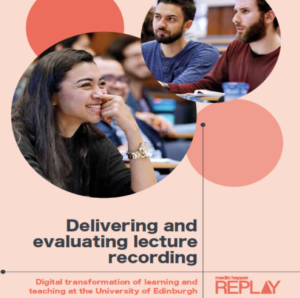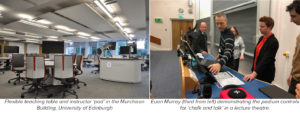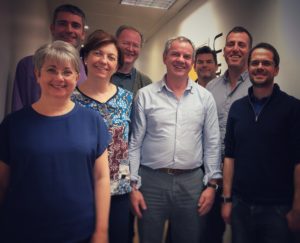What You Need to Know About the 2019 Echo360 European Community Conference and Why You Shouldn’t Miss Next Year.

The magnificent city of Edinburgh, UK, was the setting for this year’s Echo360 European Community Conference. Our hosts were the Media Hopper Team from The University of Edinburgh, led by Anne-Marie Scott, who have been trail-blazing with the implementation of their Replay lecture recording service across 400 teaching rooms during the past three years – but more about that later. Our annual gathering has now grown into a two-day conference, featuring almost 100 delegates from 25 institutions, and included a tour of several of the innovative teaching spaces used for recordings and a conference dinner overlooked by Edinburgh’s mighty castle. The EMEA team were also delighted to be joined by Fred Singer (CEO Echo360), and other senior members of the academic partnership and product development teams.
Lecture capture has been in the spotlight in the UK in recent months, so it was no surprise that talks reflected the growing need for improved policies, more flexible recording in alternative spaces, greater engagement of students, and the evaluation of student usage and their corresponding impact on grades. Our agenda therefore featured academics demonstrating their innovative use of the Echo360 tools in their teaching, a number of early research studies, and discussions around product developments in the coming year. The interstitial networking time is also critical for exchanging perspectives between Echo360 staff, support professionals and teaching academics, and the raucous conversations at the conference dinner (and beyond in the nearby bars) demonstrated that there is still much to talk about!
Here are 5 selected highlights from the conference.
-
Celebrating success, and the story of lecture recording in one institution
The end of this academic year brings to a close the three-year lecture recording programme at the University of Edinburgh. To mark this milestone moment and celebrate the many achievements, the Media Hopper Replay Team have produced a publication, ‘Delivering and evaluating lecture recording’ which tells this story and shares examples of the resources that have been produced along the way. In her excellent keynote address, Melissa Highton (Director of the Learning, Teaching and Web Services Directorate) set the context for this project, describing the vision for this ambitious, wide-reaching endeavour, but also the various academic, technical and political challenges that they encountered. For me, several features of this project set a benchmark for conducting large implementation initiatives in higher education which are:
- Having a clear and transparent plan, with an academic-focused vision and project phases which set realistic expectations to all end-users
- Using a communications expert to articulate this plan at all stages, from procurement through to business as usual
- Investing in quality (hardware, spaces, staffing), and setting expectations that the student learning experience is paramount and
- Involving key stakeholders such as academic staff to evaluate the new services and impact on learning, and students to play a major role in ensuring that it is fit for purpose.
-
But you can’t can do that in the humanities
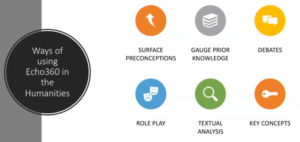
We often find that taught programmes in the humanities are the lowest adopters of lecture recordings and active learning tools across an institution. Opinions vary on the exact reasons, but some point to the fact that teaching styles tend to be less didactic and more collaborative. Is that a good excuse, well, not really when armed with little Echo360 know-how. It was therefore a real pleasure to participate in two interactive sessions with Joy McEntee (Lecturer, English and Creative Writing, University of Adelaide) on ‘But you can’t do that in the Humanities’ and ‘Lecture Recording: What do students think?’. These sessions were hugely popular with all the delegates as they nicely illustrated both the learning potential and pleasure that is easily possible when combining teaching slides with polling tasks, online Q&A, and group conversations. Joy also presented some student evaluation results which indicate a greater level of student satisfaction with this style of teaching. 89% students polled also said that using Echo360 in this way was useful to their learning, whilst 72% thought that it helped increase engagement in class.
-
Innovating practice in flexible learning spaces
Many institutions are now being challenged to transform teaching spaces, by delivering more engaging teaching in existing lecture theatres, and providing other flexible spaces to encourage collaboration, discussion and creativity. Fred Singer (CEO, Echo360) referred to this in his talk, ‘AI in Higher Education – Friend or Foe?’ as a blending of technologies and blurring of video modalities which are being replicated across all other parts of society. During the conference we also heard from a variety of presenters, from the sciences, health, humanities and languages, on their experiences of using active learning tools. There still exist pockets of faculty resistant, but the trend we are now seeing in the UK is closing on countries, such as Australia, which has readily embraced active learning approaches for several years.
In a walking tour of several teaching spaces, the two Euan’s, (Euan Murray and Euan Thompson) gave us an insight into how they are resigning rooms with flexible teaching and recording. The new collaborative teaching spaces in Murchison House can seat up to 150 students in multi-functional teaching and learning rooms, where the teaching podium is surrounded by hexagonal tables for student groups, each with their own monitor and projection facilities. This allows for combinations of didactic teaching, peer-instructor interactions, group working, and self-study. Echo360 is used to capture the teaching and interactions, when desired, with the student voice being recorded and merged with the recording with the use of the throwable Catchbox microphones. I was very impressed to see how the University are linking the teaching and learning experience in different spaces with use of similar technologies, branded notices and ‘on-air’ lighting. This was illustrated in a nearby lecture theatre which included an additional in-house innovation. The use of chalkboards remains popular across science and mathematics at the university, therefore the Team have introduced high-quality recordings of chalkboard-based teaching; these can be scheduled or manually created, either using pre-set camera positions, or using podium-based teacher controls and a confidence monitor.
As ever, these tours are a great opportunity for conference delegates to compare strategies for recording across different spaces and highlight the usual challenges around microphone types, camera positions, live streaming, on-air lights and signage. Most importantly it helps to normalise understanding about what is possible in rooms and establishes long-term friendships and alliances which are critical for recording teaching as styles and spaces evolve.
-
Understanding how students use recordings, and the impact on learning
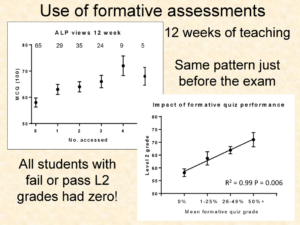
The increasing instrumentation of our classes for recording, collaboration and feedback is forcing us to consider the impact on learning and the student experience. Measuring this impact is challenging, particularly given the highly nuanced differences across teaching subjects and students’ own approaches to learning. However, emerging research results presented by Dr Louise Robson (Senior University Teacher and Director of Learning and Teaching, University of Sheffield) in her talk on ‘Do your students know the best way to use lecture capture’ illustrated significant correlation between student viewing of captures and engagement with in-class formative assessments (eg: polling activities) and their final grades. It is leading herself and the capture team at the University of Sheffield to increase the positive messaging of how to use recordings more effectively to benefit learning and minimise the potential impact on attendance. They are using the new student guidelines for lecture capture resources and pushing promotions through various channels, including, digital displays, the VLE, intro slides, social media, and custom built materials for students with special educational needs.
An alternative perspective was provided by Jill Mackay (Research Fellow, Veterinary Medical Education, University of Edinburgh) who has surveyed staff and student attitudes to lecture recordings since they were introduced through Replay. In her talk on ‘Lecture Capture:
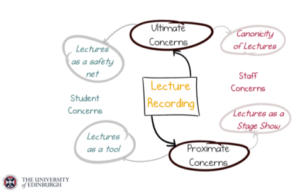
What does it change?’, she reminded all of why there can exist a tension between staff and students: staff worry that students will treat the lecture material as the final word (the ‘canon’) in what to learn, whilst students like the safety net that the recording offers; similarly, staff enjoy the performance involved in teaching (the ‘stage curtain’), but in contrast, the students see the lecture as simply a means to an end in their education (a ‘tool’). The disruptive nature of lecture recording is the subject of new research recently published by Jill.
Having innovative spaces can be highly beneficial, but what about teaching off-campus learners? Professor Perry Samson (Arthur F. Thurnau Professor of Atmospheric Science, University of Michigan) outlined how he regularly provides live streams and post-class recordings of his teaching sessions as an alternative to attending in person. Using this flexible approach, 35-50% of the cohort regularly attend, 30-40% access the live streams, 10% watch the post-class recording, and less than 5% don’t access any resources. One key benefit of using Echo360 in this way is that it provides the same level of interactivity to synchronous learners by using the engagement tools to encourage participation in discussions and polling. Flexible delivery is critical to supporting how some students access education, but Perry uses this data to motivate students to attend when possible and to take an active part in the class.
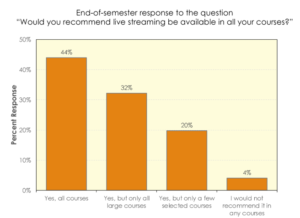
-
Introducing Echo360 EMEA academic champions
Earlier this year, the EMEA Team announced the availability of grants for a new Academic Champions programme. We were hoping to identify Echo360 practitioners in a teaching or teaching-focused role across any of our Europe, Middle East and African institutions. The aim of the programme is to identify and support leaders within institutions who can help build adoption in their subjects, departments of institutions, and celebrate successes amongst their communities, both internally and internationally. At the conference, we were pleased to publicly introduce the six Academic Champions who were chosen from a rigorous selection process.
These are just a small number of personal insights from this hugely stimulating conference. If you would like to know more about what others thought of the event, check out the #Echo360conference hashtag on Twitter. The Media Hopper Team have also produced a curated digest of the tweets, which is available on Wakelet.
Finally, this is an annual event which runs in May/June. Sign up to receive communications for the next one in 2020. We hope to see you there!

